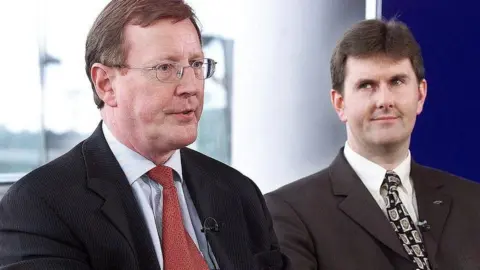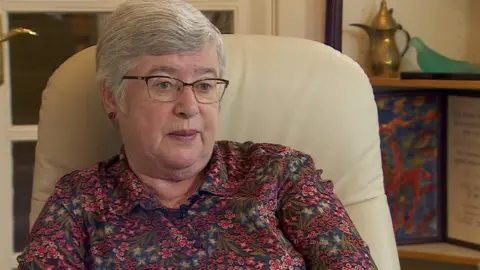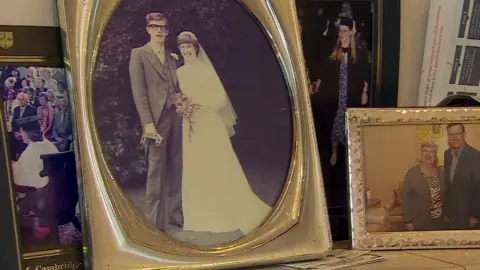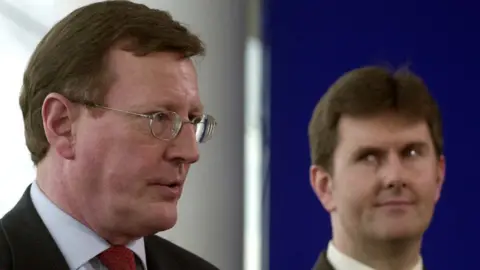Good Friday Agreement: Donaldson and Foster hurt David, says Daphne Trimble
 Getty Images
Getty ImagesDavid Trimble underestimated the emotional impact of releasing paramilitary prisoners early from jail, according to his widow Daphne.
The prisoner release scheme was agreed under the terms of the Good Friday Agreement, of which the late Lord Trimble was a key negotiator.
In her first interview since the former Ulster Unionist Party leader's death in 2022, Daphne Trimble also says he was hurt by the departure of Sir Jeffrey Donaldson and Baroness Foster to the Democratic Unionist Party (DUP) saying it was seen as a betrayal.
As the 25th anniversary of the agreement approaches, Lady Trimble looked back on the negotiations and how focussed her late husband was on the deal.
I asked her to take me back to when he got home after the deal was done on Good Friday 1998.
'Totally mentally exhausting'
"He was totally and utterly exhausted with the tension of it. I think I was sitting in the supermarket car park listening to the radio when it was announced," she said.
"That night I had no food in the house and we had fish and chips and I do remember when he went to the hole-in-the-wall to get money out he couldn't remember his PIN number.
"It was totally mentally exhausting. There weren't huge celebrations in the house, just a feeling of 'gosh we've done it'.

Unlike nationalists, unionists knew there was going to have to be a hard sell to convince their people to vote yes in the referendum that followed the agreement.
The early prisoner releases was just one of the main stumbling blocks.
"I think he may have underestimated just how important people felt the prisoner release thing was," Lady Trimble said.
"He took a judgement that a lot of these prisoners were going to be out quite soon anyway and he didn't quite realise the emotional impact it would have on the unionist population.
"He wouldn't have agreed to it if he hadn't had to because if he didn't make agreement then there wouldn't have been an agreement.
"He didn't have a choice."
Their marriage was forged in his involvement in politics and she says his focus was absolute and he operated on a 24/7 basis as the negotiations came to a conclusion.
"I would have to watch the news to see if he was coming home for his dinner. He operated on telepathy and it didn't work very well," she laughs.
"He would come home and we would talk about things and certainly in those last few weeks he would come home and show me the most recent draft and we would go through it word by word, line by line.
"Because everybody in the talks was looking at it all day every day, he was just quite glad to have fresh eyes on it from somebody who hadn't been involved in all the discussions.
"My background was as a solicitor and so looking at words and discussing what they actually mean was part of my training and I think he found it helpful that we could just go through it line by line."

Decommissioning was another stumbling block and in the early hours of Good Friday morning the then Prime Minister Tony Blair gave David Trimble a "letter of comfort" assuring him that he would continued to put pressure on republicans to deliver.
How important was that letter to David Trimble?
"It was absolutely crucial because decommissioning was such a big sticking point and when you got into the post-agreement scenario with his letter of resignation I think the truth was that he was really, really let down about that.
"Decommissioning was not done in the way David envisaged it would be have been done by republicans or by Blair. He [Blair] let David down, there was no doubt about that."
Was he hurt by that?
"He never really talked about his feelings. He was an Ulsterman and you don't do emotion."
 Pacemaker
PacemakerBut hurt is the word she uses when it comes to his former colleagues Sir Jeffrey Donaldson and Baroness Foster when they defected to the DUP.
"I don't think that was easy, that I think did hurt. It was to some extent flagged up because there had been difficulties in the party for a long time.
"There was a large minority in the part who were very very unhappy about the direction we were going in and at each stage I remember sitting here saying to him: 'You're just getting enough of a majority to make it worthwhile to go on to the next stage'."
But eventually the outworkings of the Agreement cost David Trimble his seat at Westminster and his leadership of the party.
But Lady Trimble believes it was worth it.
"I feel so proud and yes it's not been perfect and it was never was going to be perfect," she said.
"You don't get perfect. We've had 25 years of peace and peaceful government and yes it's been acrimonious and difficult and the assembly has not been functioning, but we have had a normal society and people get on with their ordinary day-to-day lives.
"People can go shopping, go to work, get on with their children, go to school in total normality and that's a huge prize.
"I think history will be kind to him. I know the number of people who still come up to me and say what a great man your husband was."
It destroyed his political career and the position of the UUP as the largest unionist party.
I asked her if that saddened her.
"I am saddened but was it a price worth paying? Yes, for peace," she said.

Declan Harvey and Tara Mills explore the text of the Good Friday Agreement - the deal which heralded the end of the Troubles in Northern Ireland.
They look at what the Agreement actually said and hear from some of the people who helped get the deal across the line.
Click here to listen to the full box set on BBC Sounds.

- TROUBLES AND PEACE: A story of history and hope - 25 years since the Good Friday Agreement was signed.
- ENDGAME IN IRELAND: The inside story of the peace process in Northern Ireland.

